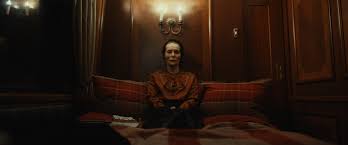LA ABUELA
In this Spanish film from Rec director Paco Plaza, Susana (Almudena Amor), a fashion model on the verge of success, has to take a career break when her grandmother Pilar (Vera Valdez) has a brain haemorrhage and she has to go and look after her, at least until she finds a carer.
Which is devastating enough, but to make matters worse, Granny, now with severely limited speech and mobility, is also a witch with designs on taking over her granddaughter’s body (and, presumably, modeling career).
This ‘old wine in new bottles’ idea is nothing new, but Plaza scores by using it to emphasise the very real horrors already apparent in the situation – that of having your loved one turn into an often baffling collection of symptoms and then into something that you feel, but don’t want to think, is actively malign. That Susana genuinely loves her grandmother only adds a further turn of the screw.
Valdez, saying little or nothing, is a suitably menacing presence with a slyly humorous twinkle in her eyes and something of Boris Karloff about her (though that might just be me). The genre elements and the dramatic ones don’t always blend so well – when Susana finally finds the perfect candidate to look after Pilar, the subsequent ‘accidental’ death of this carer is so far from coming as any sort of surprise that it feels perfunctory – but there’s enough novelty and authentic anguish here to keep us watching.
EARWIG
‘It’s not James Bond’, said the producer of the latest film from Lucille Hadžihalilovch, which will not surprise anyone who has seen her previous offerings, Innocence and Evolution. However, although her latest (an adaptation of a Brian Catling novel) certainly – as Jonathan Romney’s programme notes suggest – creates a world of its own, Hadžihalilovich doesn’t make much of an attempt to invite us into it.
There is no shortage of gloomy interiors and mist-wreathed landscapes that are quite beautiful to look at in a melancholy way, but the emotions within are so thoroughly suppressed that there isn’t much on the surface for the viewer to engage with.
A man, Albert (Paul Hilton) is charged with looking after young Mia (Romane Hernalaers), who he regularly fits with teeth made of ice. She whiles away the hours playing with earwigs until a cat (the film’s liveliest presence) arrives; eventually, she is delivered to Albert’s employer while Albert, who has – perhaps inadvertently – disfigured a barmaid (Romola Garai), falls victim to the latter when she returns as a vampire.
At any rate, that is what I remember – I may well have missed the point entirely. What I saw was a world governed by men who repress their emotions using women to bury them in, creating a dim, static landscape like a painting (like the painting of a mansion which becomes an object of fascination for the young girl). Can an authentic female agency emerge in such a world? That, I’m guessing, is the question – though even the violent outburst at the end doesn’t necessarily answer it, as it only posits woman in terms of a traditional Gothic image.
The point might be that nothing except vampirism is possible in this scenario – there can be no authentic experience – which is why watching the film is a bit like watching paint dry. Or not quite dry.
The (young) people around me did not seem impressed, yet through a light mist of boredom I was perversely intrigued. If the director’s intention was to make us feel the frustration of confinement she has succeeded, I’m sure most of the people around me couldn’t wait to get out of the Prince Charles Cinema (and their masks). But I can see myself watching this again one day.
SHE WILL
As the title may suggest, female agency is not lacking in director Charlotte Colbert’s film, in which Alice Krige plays (wonderfully well) Victoria Ghent, a film star of the old school, a kind of self-appointed aristocrat really, going to a Scottish retreat to recover from a mastectomy and appalled to discover that she is expected to take part in group activities, including painting lessons from Rupert Everett.
She is more interested in the area’s history of witch-burning (flakes of charcoal raining down upon the locality from nearby industry are referred to as ‘witch feathers’) and is soon wandering in the woods connecting with her inner sorceress.
This enables her to revenge herself upon the director (Malcolm McDowell) who (probably) abused her when she first came to prominence in one of his films at the age of thirteen. Though the most interesting relationship here is that between Victoria and her nurse Desi (Kota Eberhardt), moving from fractious to fond as the film moves on.
More jauntily sinister than terrifying, this is a blackly comic celebration not just of women but – in stark contrast to La Abuela – of old age and might be the most effortlessly entertaining film I saw in the festival this year, as well as the last, so a positive note to end on at least. Not that I generally require a happy ending, but this year it helped.


Recent Comments